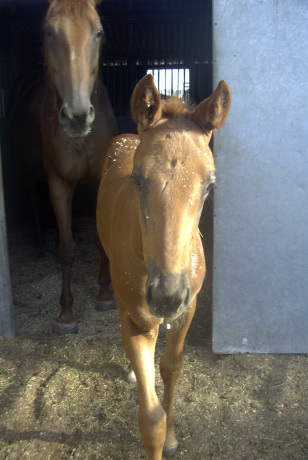Mare and Foal Nutrition
24th Dec 2017

A healthy diet for the average horse includes access to good quality forage, unlimited supply of fresh clean water and dietary supplementation when need be. When in foal, a mare is eating for two. By giving your mare everything she needs to birth a happy and healthy foal, you ensure your foal has everything they need to start off on the right hoof.
The first step to developing a balanced feeding program for your mare is to assess her body condition. Inspect her ribs, flank,neck, withers, spine, tail head and behind her shoulder for excess or lack of fat so you know where to begin.
Correct Ratio of calcium to phosphorous
If your mare’s diet is high in alfalfa hay, you’ll need to balance the calcium and phosphorus in it. Typically, alfalfa’s calcium to phosphorous ratio can be as high as 10:1. A mare in foal’s total diet should contain at least .4% calcium to .3% phosphorous. A mineral balancer like
Adeptus Augment can provide crucial nutrients that may be lacking in hay without overfeeding fortified grain. If your mare is over 15 she may require additional calcium during gestation and lactation as older horses are less efficient in absorbing those same nutrients.

Increased protein
Broodmares should be started on a rising plane of nutrition with the emphasis being on increasing crude protein (along with vitamins and trace minerals). In early gestation, protein intake should be about 1.4% of the mare’s body weight and increase slowly to 3% by the time she is lactating. Halfway through the second trimester the foal’s growth really takes off! Protein helps feed fetal tissue growth and will ensure your foal will reach their full potential. If your mare is over 15 she may require additional protein during gestation and lactation as older horses are less efficient in absorbing it.
Alfalfa for increased milk production
Good quality leafy hay is important for all horses, but after foaling it’s vital in making sure mare and foal have adequate nutrition. While lactating, many mares have the nutritional requirements of hardworking performance horses. The average mare produces 3% of her body weight in milk per day after foaling. Because of this, nutrition should be on a rising plane to support her increasing milk production. A mare can only eat so much hay so you may supplement the increased feeding needs with a commercial concentrate designed for broodmares specifically.

You can always call the friendly staff at Mary’s with your questions and for suggestions (858) 755-2015. Our knowledgeable cashiers & feed guys will be happy to help you design a good feed program for your broodmare and foal. We offer many different concentrated grain formulas specifically blended to meet their needs. As well as the high quality forage they require. Don’t forget to bring in pictures! We love seeing all of those mare & foal pics. Always consult your veterinarian or equine reproduction specialist about your mare’s needs.
For more information regarding Broodmare nutrition refer to the following: Management of Broodmares, Mare Nutrition, Feeding Mares and Foals
